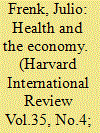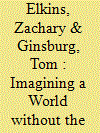|
|
|
Sort Order |
|
|
|
Items / Page
|
|
|
|
|
|
|
| Srl | Item |
| 1 |
ID:
139356


|
|
|
|
|
| Summary/Abstract |
Afghanistan is at crossroads going through a complex transition period. What transpires in Afghanistan will not only impinge on the stability and security of the country, but will have implications for the regional security scenario. After much political speculations concerning the future of Afghanistan post Karzai, a new political dispensation has now emerged in Afghanistan, as the withdrawal policy of the United States stands at a critical juncture.
|
|
|
|
|
|
|
|
|
|
|
|
|
|
|
|
| 2 |
ID:
148308


|
|
|
|
|
| Summary/Abstract |
This study examines conditions under which states in East Asia engage in the development of regional institutions. It assumes that crucial external events and shocks, which produce specific historical breakpoints – critical junctures – constitute a significant breakpoint at which the regional states willingly elevated a path to develop regional institutions to a new level. The analysis of the development of regional institutions for a free trade area and food stock for emergency revealed that regional states in East Asia changed their views on the evolving reality created by external shocks and such changes led to the creation of new regional institutions.
|
|
|
|
|
|
|
|
|
|
|
|
|
|
|
|
| 3 |
ID:
170285


|
|
|
|
|
| Summary/Abstract |
Existing research suggests that democratization can run counter to building peace in post-conflict contexts. This article analyses the effect of two competing strategies that external actors use to address the conflict of objective between democracy and peace: prioritization and gradualism. The prioritization approach advises sequencing, which means postponing support for democratization and concentrating first on peace in terms of the absence of violent conflict. The gradualist approach promotes peace and democracy simultaneously. This article offers a systematic analysis of these two prominent donor strategies. To this end, it focuses on two critical junctures in two similar post-conflict settings (Burundi and Nepal). Drawing upon extensive field research, the analysis shows that a gradualist approach is not more risk-prone than a prioritization strategy. To the contrary, the analysis suggests that even in most fragile contexts, gradualism can help to foster peace. Prioritization, in turn, may also contribute to the instability it aimed to prevent. Two factors condition the effect of the selected strategy on peace: which dimensions of democracy are affected and to what degree, and whether the institutional context reinforces or counteracts this trend.
|
|
|
|
|
|
|
|
|
|
|
|
|
|
|
|
| 4 |
ID:
132545


|
|
|
|
|
| Publication |
2014.
|
| Summary/Abstract |
W e are at a critical juncture in efforts to promote development around the world. If we are to meet the challenges of our times we need new forms of thinking and acting. The key to deal with a changing and increasingly complex reality is integration, and the starting point for integration is the acknowledgment of the crucial notion that social and economic policy are really two sides of the same coin. The recent evolution of global health epitomizes this idea. Indeed, many observers have remarked that the past decade can be seen as a new era in global health. The most important feature of this is the fact that health matters have stopped being the exclusive concern of domain experts. Instead, health has come to occupy a central place in the most pressing dimensions of the global agenda: economic development, national security, democratic governance, and human rights. In this context
|
|
|
|
|
|
|
|
|
|
|
|
|
|
|
|
| 5 |
ID:
186731


|
|
|
|
|
| Summary/Abstract |
The Universal Declaration of Human Rights (UDHR) is thought to have shaped constitutions profoundly since its adoption in 1948. The authors identify two empirical implications that should follow from such influence. First, UDHR content should be reflected in subsequent national constitutions. Second, such reflections should bear the particular marks of the UDHR itself, not those of the postwar zeitgeist more broadly. The authors examine the historical evidence at various levels to identify and untangle the UDHR's impact. In a macro analysis, they leverage an original data set on the content of constitutions since 1789. They explore historical patterns in the creation and spread of rights, and test whether 1948 exhibits a noticeable disruption in rights provision. The authors build a multivariate model that predicts rights provision with constitution- and rights-level covariates. To gain further analytic leverage, they unearth the process that produced the UDHR and identify plausible alternative formulations evident in a set of discarded proposals. The authors further test the plausibility of UDHR influence by searching for direct references to the document in subsequent constitutional texts and constitutional proceedings. The evidence suggests that the UDHR significantly accelerated the adoption of a particular set of constitutional rights.
|
|
|
|
|
|
|
|
|
|
|
|
|
|
|
|
| 6 |
ID:
098146


|
|
|
|
|
| Publication |
2010.
|
| Summary/Abstract |
Sub-state nationalist parties of the industrialised West occupy different positions along the left-right political spectrum. Despite the similarities of their political agendas, these parties adopt different ideological identities. This paper seeks to explain the choice of party position and the long-term consistency of these positions by employing a path-dependent perspective. The focus is first, on the critical junctures during which such choices are made; and second, on the mechanisms of continuity ensuring the persistence of the left-right identities. The argument is explored within the empirical context of Québécois nationalism.
|
|
|
|
|
|
|
|
|
|
|
|
|
|
|
|
| 7 |
ID:
112462


|
|
|
|
|
| Publication |
2012.
|
| Summary/Abstract |
China, Japan, and Korea have begun to engage one another vigorously since the 1997 crisis. As intraregional economic ties have further deepened and broadened, interconnectedness in cultural and political aspects has risen rapidly in a variety of forms. Decision-makers and intellectuals in China, Japan, and Korea have been floating ideas and interests for establishing various types of Northeast Asian community formation. New security dialogues and co-operation frameworks also emerge. Accordingly, the rapidly growing Northeast Asia is likely to emerge as an identifiable regional community. With the incipient emergence of regional community in Northeast Asia, Northeast Asian region-building becomes a salient issue of major academic and policy debates. Yet, in spite of the recent mushrooming of research in and attention to the region-building, the questions regarding within what surrounding and under what situation regional community can be built, as well as what motivates people to choose region-building, and when and how state system can be transformed into a regional community remains only partly resolved. In order to solve this puzzle, this paper will compare the current Northeast Asian region-building with the early stage of European region-building, arguing that while there are important differences in evolution, format, and kind of region-building in Europe and Northeast Asia, critical juncture is influential in region-building.
|
|
|
|
|
|
|
|
|
|
|
|
|
|
|
|
| 8 |
ID:
121871


|
|
|
|
|
| Publication |
2013.
|
| Summary/Abstract |
Why do some newly formed regimes incorporate religion in various dimensions of public affairs, while others relegate religious actors and content to the private sphere? This article offers an explanatory model with four key components that together determine the status of religion in newborn political regimes: (1) the pervasiveness of religion in the old order; (2) the overlap among different ingredients of national-identity; (3) the constraints of demographic realities; and (4) the period before and during the formation of the new regime as critical juncture. The model is applied and tested in the cases of Israel and Turkey, which in many respects represent opposite trends - accommodation and marginalization, respectively - that produced broad and long-term consequences for their respective political regimes.
|
|
|
|
|
|
|
|
|
|
|
|
|
|
|
|
|
|
|
|
|